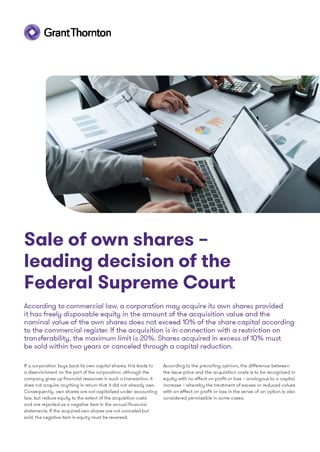-
Audit Industry, Services, Institutions
More security, more trust: Audit services for national and international business clients
-
Audit Financial Services
More security, more trust: Audit services for banks and other financial companies
-
Corporate Tax
National and international tax consulting and planning
-
Individual Tax
Individual Tax
-
Indirect Tax/VAT
Our services in the area of value-added tax
-
Transfer Pricing
Our transfer pricing services.
-
M&A Tax
Advice throughout the transaction and deal cycle
-
Tax Financial Services
Our tax services for financial service providers.
-
Advisory IT & Digitalisation
Generating security with IT.
-
Forensic Services
Nowadays, the investigation of criminal offences in companies increasingly involves digital data and entire IT systems.
-
Regulatory & Compliance Financial Services
Advisory services in financial market law and sustainable finance.
-
Mergers & Acquisitions / Transaction Services
Successfully handling transactions with good advice.
-
Legal Services
Experts in commercial law.
-
Trust Services
We are there for you.
-
Business Risk Services
Sustainable growth for your company.
-
IFRS Services
Die Rechnungslegung nach den International Financial Reporting Standards (IFRS) und die Finanzberichterstattung stehen ständig vor neuen Herausforderungen durch Gesetzgeber, Regulierungsbehörden und Gremien. Einige IFRS-Rechnungslegungsthemen sind so komplex, dass sie generell schwer zu handhaben sind.
-
Abacus
Grant Thornton Switzerland Liechtenstein has been an official sales partner of Abacus Business Software since 2020.
-
Accounting Services
We keep accounts for you.
-
Payroll Services
Leave your payroll accounting to us.
-
Real Estate Management
Leave the management of your real estate to us.
-
Apprentices
Career with an apprenticeship?!

If a corporation buys back its own capital shares, this leads to a disenrichment on the part of the corporation: although the company gives up financial resources in such a transaction, it does not acquire anything in return that it did not already own. Consequently, own shares are not capitalized under accounting law, but reduce equity to the extent of the acquisition costs and are reported as a negative item in the annual financial statements. If the acquired own shares are not canceled but sold, the negative item in equity must be reversed.
According to the prevailing opinion, the difference between the issue price and the acquisition costs is to be recognized in equity with no effect on profit or loss – analogous to a capital increase – whereby the treatment of excess or reduced values with an effect on profit or loss in the sense of an option is also considered permissible in some cases.
Decision of the Federal Supreme Court of June 6, 2024
According to the facts of the case, a holding company listed on the Swiss stock exchange acquired own shares for an employee participation program. The allocation of these own shares to employees resulted in a gain between the acquisition cost and the reissue price, i.e. the value at the time of allocation. The company recognized the difference – in accordance with the accounting regulations under commercial law – in the legal capital reserve with no effect on income.
In this case, the Federal Supreme Court had to deal with the question of whether the difference between the reissue price under the employee participation program and the acquisition costs at the taxable holding company constitutes a tax-neutral capital contribution or whether it should be offset against the taxable net profit as a taxable capital gain due to a correction provision under tax law.
The cantonal tax office and the Swiss Federal Tax Administration (FTA) were of the opinion that, based on a correction provision under tax law, a deviation from the disclosure under commercial law was permissible and that the additional proceeds accordingly constituted a taxable capital gain.
The Federal Supreme Court held that the correction standard put forward by the FTA, which states that the taxable net profit from the income statement is not made up of credited income, is not relevant in this case, as no “income” is generated when own shares are reissued. Insofar as own shares previously repurchased by the company are issued in an employee participation program, this is to be seen as a tax-free capital contribution. In agreement with the lower court’s statements, the Federal Supreme Court stated that the taxpayer’s choice of recognition in equity was not objectionable.
With this leading decision, the Federal Supreme Court has for the first time ruled on the question of the treatment of own shares for profit tax purposes and has clarified that not every increase in assets at company level must constitute taxable profit. If the reissue of own shares results in a positive difference between the acquisition cost and the reissue price, the gain cannot be qualified as taxable due to a lack of income.
The acquisition and reissue of own participation rights raises various tax issues that need to be clarified in specific cases.
Grant Thornton Switzerland/Liechtenstein will be pleased to support you as a competent partner in these matters.
We look forward to hearing from you.


